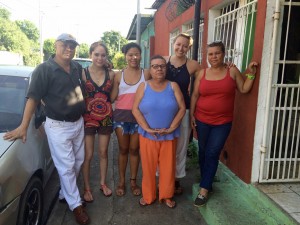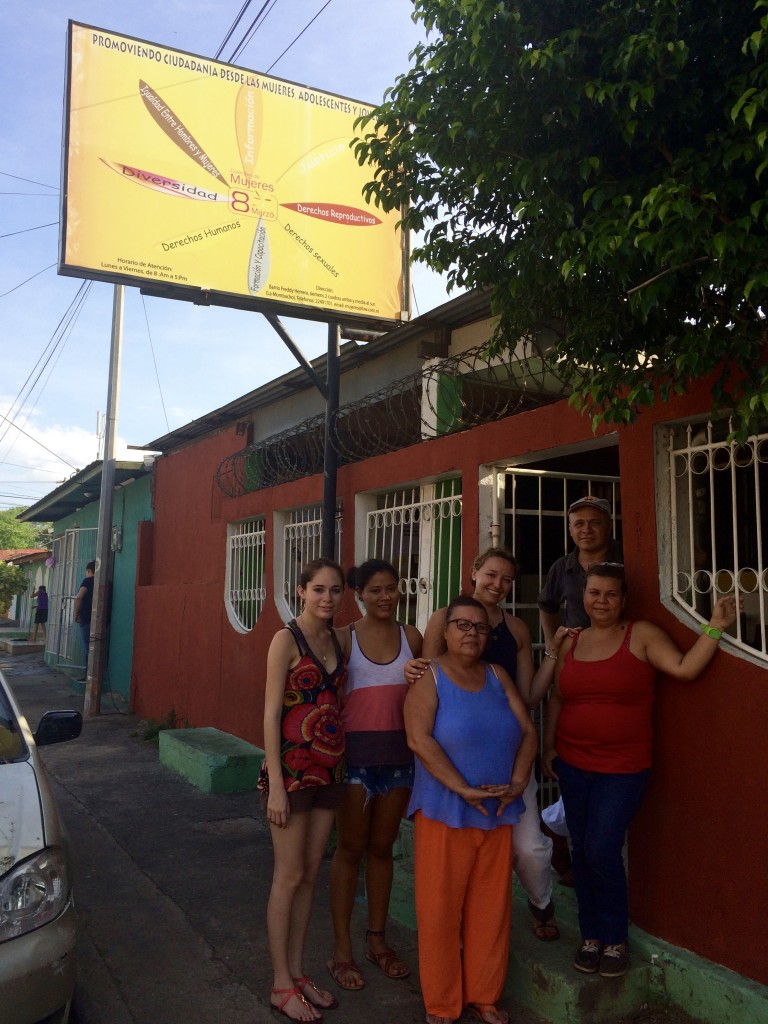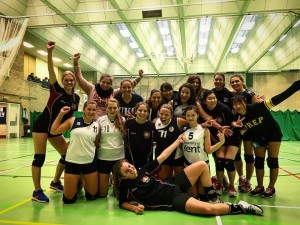Canadian student Mélisande Masson completed a term of studies at Kent Law School as part of a reciprocal exchange agreement with one of our partner universities in Montréal. After returning to Canada to complete her degree in Civil Law, Mélisande is now working in a women’s right organization in Nicaragua that specializes in reproductive and sexual rights, and domestic violence. Mélisande got in touch to let us know how thankful she feels to have taken classes at the Law School and how she has been applying the principles she learned in her practice in Nicaragua. We caught up with Mélisande to ask her more about her exchange experience at Kent (which Mélisande describes as an ‘academic adventure’):
Congratulations on graduating in April! Can you tell us where and what you studied for your undergraduate degree?
Thank you ! After a year of Psychology studies, I decided it wasn’t quite what I was looking for and made my way to Law school. I have just completed my Bachelor of Civil Law at the Université de Montréal, a French university in the wonderful city of Montréal, Canada.
Can you tell us why you chose to study a term of law in the UK and more specifically, what attracted you to Kent Law School?
Although I had many different options for my exchange term, after careful consideration, I knew without a doubt that I wanted to attend Kent Law School. Many fundamental aspects of Canadian law are derived from English law, so I was curious to further explore the roots of our legal system. What I would gain from studying at Kent Law School could easily contribute to my academic studies back home, due to the similarities.
Visiting a good friend of mine living in England only consolidated my decision. I absolutely fell in love with the culture, the lifestyle and the people. I immediately started looking into the different courses available and couldn’t believe the diversity. As a student with a keen interest in international law as well as gender studies, I was thrilled to see entire modules that focused on these subjects.
What were the highlights of your time at Kent Law School?
I would definitely have to say that the structure of the modules as well as the professors. It’s a very dynamic environment, completely different from the system I was used to in Montréal. To be completely honest, at first I was a little terrified that I would have to participate in seminars. However, the material was so engaging, that soon I found I couldn’t help myself. Kent Law School’s critical approach to law really helped me develop my argumentative skills and influenced my professional work ethic. They are skills I use daily in my work environment and definitely give me a competitive advantage.
Furthermore, I still can not believe the quality of professors I had a chance to learn from. Clearly passionate about their subjects, they were experts in their field and kept up to date on the contemporary debates. They were always readily available to discuss course material or debate my essay topics, which I believe contributed to my desire to push myself further in my critiques.
How did you benefit from your exchange term at Kent Law School and how did it contribute to your overall student experience?
My exchange term at Kent Law School contributed to broadening my horizons in regards to my legal studies. Because of the diversity of subjects I studied, I was able to take basic legal concepts that I had previously learnt and transpose them to contemporary situations. My professors taught me to constantly reflect and be critical my work and the state of the law, a skill I believe is essential to my future practice.
Moreover, my exchange term came at a perfect timing. I was in the last stretch of obtaining my L.L.B. and was losing stamina. When I arrived in my first Kent Law School seminar, I was surrounded by peers from across the world, all with different life experiences and point of views to contribute to our debates. From Virtue Theory to Utilitarianism, to the role of the World Bank in International Development, no subject was off the table. One of the highlights of my academic exchange were the Centre for Critical International Law’s Film and Speaker Nights where I got to listen to individuals, such as Saleem Vahidy, that had actually participated in some of the events that I had only ever read about in class ! It was just the push I needed to complete my studies and reinvigorate my passion.
Can you tell us more about the work you are doing now in Nicaragua?
As of May 2016, I have joined the wonderful and hardworking team at el Colectivo de Mujeres 8 de Marzo (CM8M) in Managua, Nicaragua, a NGO that advocates and defends women and girls’ human rights, specifically concerning sexual and reproductive rights as well as in the relm of gender-based violence. I specifically work as a Women’s Rights Officer, which allows me touch many different projects within the organization. From devising public awareness campaigns, to debating and developing project proposals with my colleagues, to translating grant requests…there’s never a dull moment!

Mélisande pictured above with colleagues in Nicaragua (second from right)
El Colectivo de Mujeres 8 de Marzo focuses on two main issues : systemic violence against women that persist today and women’s lack of agency in regards to abortion. In the last 5 years, 390 women were victims of feminicide and a lot of CM8M’s efforts focus on repositioning women in Nicaraguan society as well as equiping them to stand up against situations of violence. In 2006, the Constitution was modified to criminalize all forms of abortion, including therapeutic, opening the floodgates for a innumerable quantity of violations of women’s rights, safety and health. El CM8M has filed motions to the Supreme Court for inconstitutionality, but we will also be working on a program to support and provide ressources for teen mothers.
What future plans do you have?
In 2017, I will be completing the Québec Bar Exam in order to obtain my licence to practice law. I am looking into clerking for organizations and companies that specialize in assisting vulnerable populations, either on a national or international scale. Afterwards, I am very keen to complete a Master’s degree with a focus on Gender, International Development and Law. My dream would be to obtain an internship with UN Women, Unicef or Lawyers Without Boarders.
Ideally, I’d eventually like to work with an organization that has a multi-disciplinary approach to law and gender issues. Although I appreciate the study and practice of law, I am also very passionate about working with the younger generations in program development because I think this is a wonderful tool for change. And if I can teach as well, either at the collegiate or university level, that would be great !
What advice would you give other students considering doing an exchange with Kent Law School?
If doing an exchange at Kent Law School’s an option, go for it ! It’s one of the best decisions you’ll ever make! The University of Kent at Canterbury in its entirety has so much to offer. The International Office has many events to help you meet other students and there’s plenty of opportunities to travel around with the various clubs on campus. Whatever your passion…pole fitness, cooking, litigating…there’s a club for you! I hesitated before joining the volleyball team because I was worried it would be overwhelming with my studies, but it actually ended up being very advantageous ! I met an amazing group of people who helped me to integrate into the community and who were my support network in times of need.
Kent Law School, and the University, will provide you with everything you need to succeed. From helpful staff, to brilliant professors, to a dynamic campus life – Kent Law School is an incredible experience to live during your academic adventure!


